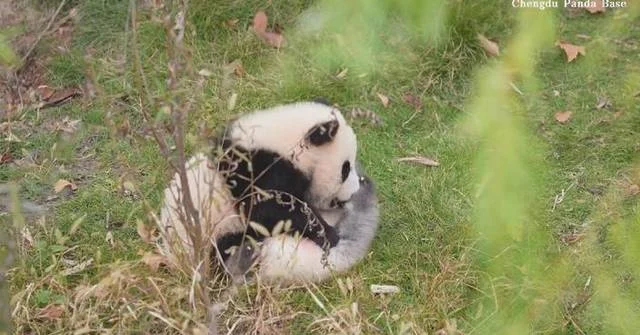Adorable panda cub tries to wake up fellow cub at Chengdu breeding base

A recently-released video captured an amusing moment of tender interactions between two giant panda cubs with one trying to wake up the other and pull it to its feet at a breeding base in southwest China’s Sichuan Province.
The young fluffy cub was lying on its back on the grass at the Star Giant Panda Nursery House in the Chengdu Research Base of Giant Panda Breeding on Oct. 16 when the old one made several attempts to pull it up but failed.
The giant panda pair were born this year.
The Chengdu Research Base of Giant Panda Breeding is a world-renowned center for the ex-situ conservation of giant pandas. It also serves as a hub for scientific research, public education, and ecotourism. The institution is internationally recognized for its contributions to the protection and breeding of giant pandas, red pandas and other endangered wildlife species native to China.
Adorable panda cub tries to wake up fellow cub at Chengdu breeding base
Adorable panda cub tries to wake up fellow cub at Chengdu breeding base
The ongoing 8th China International Import Expo (CIIE) is offering favorable policies to businesses from Least Developed Countries (LDCs), helping them showcase their products at the event.
This year’s CIIE has established a dedicated section for products from the least-developed countries, offering exhibitors exemptions from booth fees.
As a result, 163 businesses from these countries have brought their best products to Shanghai — shea butter, coffee, chocolate, honey, and much more.
Exporters from LDCs have been enjoying beneficial access to the Chinese market that extends far beyond the CIIE exhibition grounds. Since December 2024, all LDCs holding diplomatic ties with China have enjoyed 100 percent zero-tariff treatment, leading to a 9.7-percent increase in imports from these nations in the first three quarters of 2025.
“For the last two years, I don’t pay fees. That makes me happy about the little savings that I would have paid here makes me to expand and put (investment) on the production, which is very good. My country, South Sudan, just separated from Sudan about 12 years ago. But now with the split, we are the northeast separate and southeast separate, China is still engaging both countries separately. For us, it’s a good business opportunity,” said exhibitor Justin Tata.
“It gives us more opportunity for African countries to bring the products in China, and also at an affordable price. Because the competition in China is very high, so if it’s zero (tariffs), it means we are able to bring our products at very good prices to be able to compete in the China market,” said Njoki Hazel, an agricultural product exhibitor.
Chinese businesswoman Zhang Ting runs an animal husbandry company in Madagascar. In 2024, the company successfully imported lamb from Madagascar to China with the tariff policies, and their products became available in Chinese supermarkets this year.
According to Zhang, China’s warm and inclusive approach to opening up will further bolster cooperation and development within the Global South.
“Leveraging our partner’s distribution channels, we successfully entered China’s premier fresh food platform in October. This opens a vital channel for countries like Madagascar, which lacked beef or lamb export opportunities for decades, transforming local sheep farming from mere subsistence into a sustainable livelihood and boosting the entire live sheep supply chain,” she said.
Themed “New Era, Shared Future”, this year’s CIIE runs from Nov 5 to 10. It features the largest exhibition area in its history and a record 4,108 overseas exhibitors from 155 countries, regions, and international organizations.
Waived booth fees help least developed countries bring wide-ranging products to CIIE





